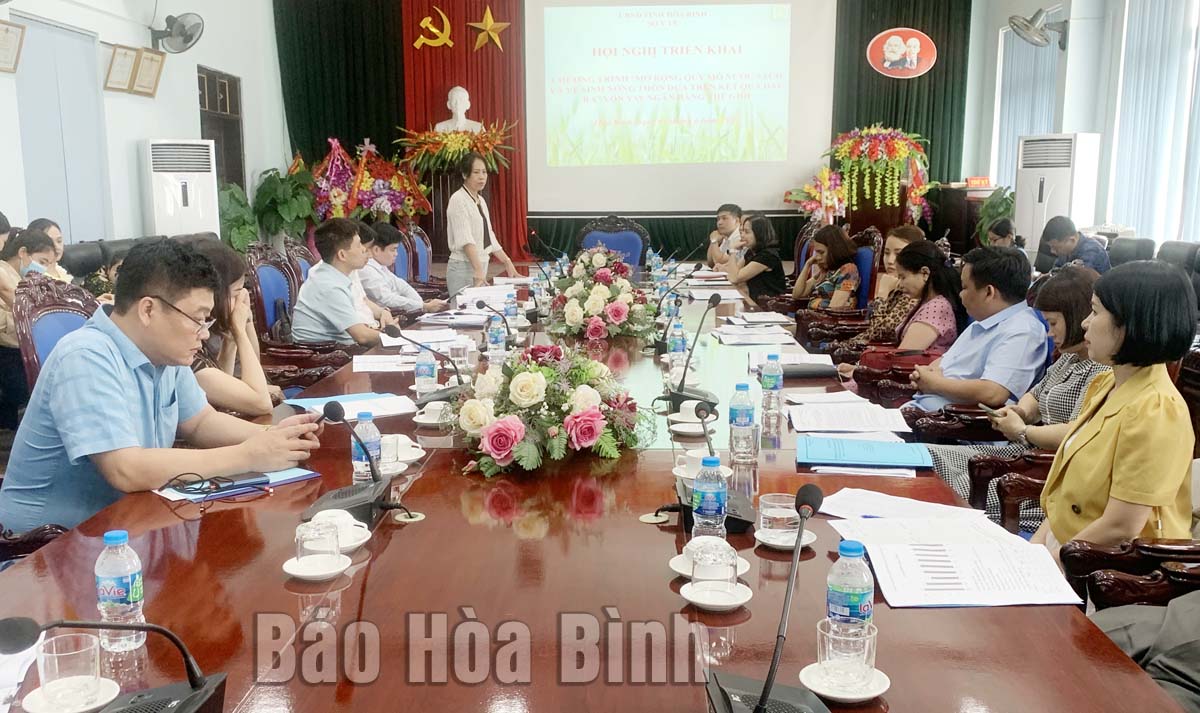
(HBO) - In the afternoon of June 3, the Department of Health held a conference to implement the program "Expanding the scale of the rural clean water and sanitation based on the output” with the loans from the World Bank.

The delegates are discussing at
the conference.
The program is implemented in 21
provinces in the Northern mountainous region, the Central Highlands and the
Southern Central region, including Hoa Binh province. The programm was
conducted in the period of 2016 - 2020, however, it has been allowed to last
until the end of December 2022 by the Governemnt due to the impact of Covid-19
pandemics. The program focuses on providing the communication activities to
change the behavior, developing the sanitation market and building the
infrastructure to support the behavior change, support the sustainable service
development and build the institutional capacity for the service delivery. In
Hoa Binh province, the program has been implemented since 2018, with the goal
of 60 communes achieving the commune-wide sanitation, 30 communes achieving the
sustainable commune-wide sanitation, 85 water works and communal health
stations' latrines being renovated and newly built. Up btill now, 85 water
works and the medical sanitary latrines have been built and renovated; 32 out
of the 60 communes have achieved the commune-wide sanitation, 11 out of the 30
communes have achieved the sustainable commune-wide sanitation.
The conference has focused on
discussing and analyzing the difficulties and obstacles in the actual
implementation process in the locality, especially in the remote and
mountainous communes and areas with difficult economic conditions in Kim Boi,
Da Bac, Cao Phong districts, which have the low rate of hygienic latrines for
the households. Thereby, it has been contributing to the completion of the plan
and roadmap so that all households have and use the hygienic latrines by 2030
according to the Government's commitment to the international community.
With just over a month left until the school summer break, students are eagerly anticipating a period of rest and fun after a year of academic pressure. To provide a healthy environment for the physical development, in addition to the classes that foster talents and enhance the academic knowledge, sports and physical activities continue to attract a large number of children and teenagers.
On April 17th, Hoa Binh Provincial Museum organized a program to promote and introduce the outstanding values of "Hoa Binh Culture” at the Boarding Secondary and High School for ethnic minority students in Mai Chau District.
The Hoa Binh College of Technical Technology, in collaboration with the Hoa Binh Technical and Economic College and the provincial Association of Literature and Arts, hosted a gathering on April 15 to celebrate Laos’ traditional Bunpimay (New Year) Festival 2025 and debut the new book "Nguoi Muong o ban Don” (Muong people in Don village).
In the millennia-long history of national construction and safeguarding, people of all ethnic groups in Hoa Binh have been united and closely bound together to overcome all difficulties and challenges, standing alongside the entire Vietnamese people throughout the history of building and defending the country.
Living green is a healthy, positive, and sustainable lifestyle that not only helps protect
the environment and quality of life but also conserves natural resources and ecosystems.
Among the many ways to embrace this lifestyle, reducing plastic consumption is one of the most impactful.
The women's unions at all levels in Kim Boi district have been making significant contributions to the movement of building cultural life in the local community.
The movement helps improve rural look and the spiritual and material lives of local residents.



